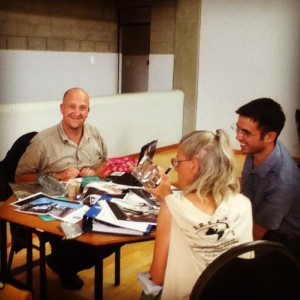In-Service-Training (IST) for Group 10 is now over. It has been a long week for me to come back into after so long in the US. I’ve honestly not had enough time to decompress or reflect on my experiences in the US since I had to hit the ground running.
Saturday was a pleasant experience as it was the first I saw Krista in several weeks. Time is flying by and it is far too infrequent that I get to spend any time with her. Sadly she left early Sunday morning for training in Jo’burg. Luckily I’ve been so busy with IST that there has been little time to reflect on how much I miss her.
My nights have been starting the same this week, around 5am I wake up and make some coffee. I get on the computer and start reviewing the notes that I fell asleep while writing somewhere around 10 the night before. My sessions this IST actually weren’t that difficult, but with nearly zero prep time and my return from the land of amazing, I have found this time very challenging.
My first session was a 2 hour lesson on how to use the Peace Corps reporting software. The software is a very complex multi-part java application designed to gather as much information as possible regarding a volunteer’s previous several months at site. Due to the amount of work that Krista and I would do in a given 4 month period, we would pour over multiple netbooks, spreadhseets, and scraps of paper for several days filling these reports out.
The tediousness of the report aside, it has always been a bit quirky. Just as in the late 1990’s people learned that if you don’t click “save” often, there is the very real possibility that something will crash and you will lose that 10 page paper you had just finished. Unfortunately this is that program. The program was designed with the best of intentions, but is just a bit on the flaky side. Thankfully as a PCVL I am allowed to give my unfiltered opinion, and reminded the volunteers to save early and save often.
My second session for the week is a much more familiar topic, as I have given two large presentations on it over the last two years. My first large presentation for Appropriate Technology came last year during IST for Group 9. It was quite a confidence builder and eye opener to present to over 100 of my peers. The second instance of this presentation manifested itself with Ryan and Addy Hall’s cleanup campaign where I presented to a mix of 30+ international refugees and Swazis.

Instead of a formalized presentation with slides, the session was formed as an information fair, with each table hosting different resources. This was great as it allowed me to spread out my random bits of things, and include more information than I would have been allowed in another hour presentation. I talked to 35 volunteers on
- solar disinfection for drinking water
- solar panel education kits
- solar ovens
- charcoal from paper
- charcoal from maize cobs
- mosquito nets used as window screens
- homemade ceiling insulation
- using 2 liter bottles for building material
- soil testing available through the Ministry of Agriculture
- topsoil erosion
- converting used juice boxes into condom dispensers and pamphlet holders
- the water proof nature of coconuts
- reuse of old tin cans to block rats from crawling into grain shelters
- creating a Cantenna to extend our wifi network (Sikhumbo takes the credit for making our cantenna)
- furniture from bamboo
I have come to appreciate over the last 2 years that “Appropriate Technology” is a very complex topic, and likely something that could be turned into a career itself. As a component of how I view sustainable development, I have acquired a bit of passion for it.
It is critically important to understand availability of local material, and cultural acceptability for any solution to achieve its desired effect. As I have learned just because a technology is fantastic and solves many problems, doesn’t mean it is actually going to work in practice. I love the ideas behind cooking strictly from solar, but in the society I currently live in, it simply won’t work on a large scale unless resources greater than I can muster put their weight behind it. And if something is fantastic and solves problems, but can only come from distant land, or be purchased via a credit card, then it is hardly a solution in the rural wold.
I originally was slated for only three sessions this week, but my fourth came late in the evening on Wednesday. Fortunately this was a session lead by Daynese(Day) our post medical officer. I say fortunate because I knew it would be fun, enjoyable, and almost completely improvised. Day doesn’t believe in scripts, and I appreciate that sincerely. The session was on sexual harassment and I was to serve on a panel of veteran volunteers discussing our own experiences. This was no more difficult than a cake walk, and as enjoyable as the delicious chocolate frosted donut that Day bought me before the panel.
Immediately after the sexual harassment session, I had to get back to the Peace Corps office over 20 miles away. I had been prepping all week for my capstone event, co-facilitating a 3 hour training on improved cook stoves. I made my first cook stove several hours before I was to train everyone on how to make theirs.I am pleased to say that the results of the other 40 PCVs were far superior to my own.
Our country director served as a Peace Corps volunteer in Senegal in the late 80’s, and one of his largest projects was teaching his community on how to build these improved cook stoves. For my stove I followed the guide provided by http://practicalaction.org/energy/improved_clay_stoves. I received a proper critique on my own work just prior to the session starting with the other volunteers. His long-term experience coupled with my recent foray culminated with two decent stoves made by PCVs, and 40 people walking away with knowledge on how to make these stoves on their own homestead. Afterwards I led a break away session and talked with 5 other PCVs about making simple solar ovens for their own personal use.
It has been a terrific week, and it is now time to decompress for a few hours. Tomorrow I travel to Siteki and on to my first week back at the college. And a week from today is the first real meeting for the Swaziland Computer Society. That is one event I am really looking forward to.

